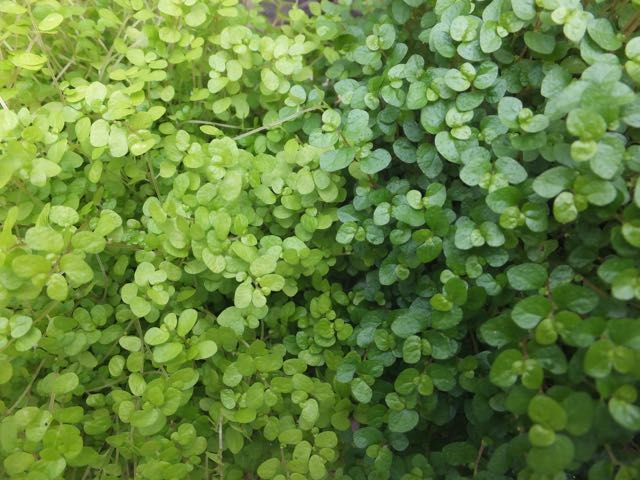
This charming greenhouse beauty was described by Linnaeus as “Mere weeds, found on old walls and stony ground, they have no beauty and are of the easiest culture”. Back then he named it as a Parietaria it then became a Helxine, and now it is Soleirolia soleiroli. The common names are even more prolific, it has been known as Japanese Moss, Irish Moss, Baby’s Tears, Corsican Carpet and the most apposite Corsican Curse. However the name most Brits know it by is Mind your own business the derivation for this being lost.
Mind your own business is a relative of stinging nettles and was introduced to gardens from the Mediterranean islands, especially Corsica, in about 1820 when it immediately found favour for cloaking the rocky surrounds of grottos, fountains and statuary especially where the site was cool, damp and partly shady. Its ability to rapidly clothe large areas with a carpet of soft verdant moss like green was appreciated and it is still fantastic for creating a verdant backdrop or surrounding to other more architectural or flamboyant plants and looks especially good with ferns.
Sadly it got a bad name for being a tad invasive, indeed it did become a bit of a curse in old houses where it ran under the staging and into every nook and cranny. Thus unless you wish to cover far more than you wish it is wise to keep this plant confined to containers which restricts it to more manageable neat domes and soft green mounds. Oddly although a rampant ground hugging creeper it is not much of a trailer and the stems seldom hang far below the rim of the pot, even so it can be excellent in hanging baskets.
Surprisingly this is quite tough and although tender will come again from the roots unless extremely hard frozen. It can sometimes set seed from minute near invisible greenish flowers but invariably is propagated by division as this is so rapid. The green form is commonest but a charming yellow is also available and a less vigorous variegated version is sometimes offered.
One oddity of this plant is it should not be stroked (as appealing as this is) for allegedly some peoples skin is ‘too acid’ and can cause damage (I have never observed this). However in the past it was certainly known to be killed by leaking fumes from gas stoves (which back then ran on coal gas)- which would probably have done for the gardener too.










